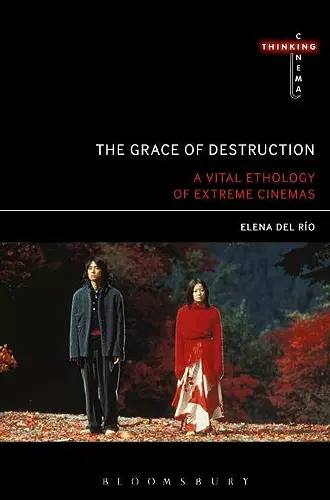The Grace of Destruction
A Vital Ethology of Extreme Cinemas
Format:Hardback
Publisher:Bloomsbury Publishing PLC
Published:5th May '16
Currently unavailable, and unfortunately no date known when it will be back

A Deleuzian study of the negative affects in extreme/violent cinemas as a form of ethological experimentation.
For Elena del Río, extreme cinema is not only qualitatively different from the representations of violence we encounter in popular, mainstream cinema; it also constitutes a critique of the socio-moral system that produces (in every sense of the word) such violence. Drawing inspiration from Deleuze’s ethics of immanence, Spinoza’s ethology of passions and Nietzsche’s typology of forces, The Grace of Destruction examines the affective extremities common in much of global, contemporary cinema from the affirmative perspective of vital forces and situations—extremities such as moral/religious oppression, biopolitical violence, the pain involved in gender relations, the event of death and planetary extinction.
Her analysis diverges from the current literature on extreme cinema through its selection of films, which include key international examples, and through its foregrounding of relational, affective politics over representations of sexuality and graphic violence. Detailed formal and philosophical analyses of films like The White Ribbon, Dogville, Code Unknown, Battle in Heaven, Sonatine, Fireworks, Dolls, Takeshis’, Inland Empire and Melancholia are meant to move us away from the moral appraisal of violence and destruction, and to compose an ethological philosophy of cinema based on Deleuze’s idea that, “when truth and judgment crumble, there remain bodies, which are… nothing but forces.”
Del Río’s Grace of Destruction… [continues] to invigorate the conversation surrounding the new extreme cinema while also expanding the applicability of its terms in productive and challenging ways that particularly encourage us to consider the ethical and philosophical ramifications that only the extreme encounter can engender. * Alphaville: Journal of Film and Screen Media *
The exploration of how Deleuze’s inflections of Nietzschean and Spinozan thought are brought out ... are precise, well-researched, pertinent and compelling. he philosophies are engaged with and pursued in rigorous fashion often via contemporary scholarly reworkings, which elicit surprising yet convincing conclusions ... The chapters are well linked and build neatly upon one another, but readers familiar with the book’s philosophical touchpoints could nonetheless dive directly into individual chapters should they be so inclined. * Film-Philosophy *
[The Grace of Destruction]... is an inspiring and thought-provoking book that should appeal to a broad readership (interested in global film, film philosophy, cine-ethics, extreme cinemas, and politics) and is fit for an era when critically interrogating the habitual ways in which we think, live, and act (as citizens and a species) has never been more important. -- David H. Fleming * SYMPOSIUM: The Canadian Journal of Continental Philosophy *
Elena del Río's The Grace of Destruction is a remarkable book combining a passion for cinema that yields stunning critical insights with an acute theoretical genealogy of contemporary culture’s moralism. Although thoroughly attuned to the most recent developments in Deleuzian philosophies of cinema and affect, and without being negatively reactive against the contemporary field of cinema studies, del Río's work manages to be breathtakingly original. Anyone interested in cinematic aesthetics and the radical potential of cinema as a mode of thought should read this book. * Claire Colebrook, Edwin Erle Sparks Professor of English, The Pennsylvania State University, USA *
In her formidable new book, The Grace of Destruction, Elena del Río examines a corpus of violent, shocking, and ultimately extreme films—the very films that moralists might otherwise condemn—in order to mount furious critique of the transcendent values of modern morality. In conversation with Spinoza, Nietzsche, Deleuze, and Guattari, among others, The Grace of Destruction dares its readers to conceive of cinema as a vitalist ethics, but also to grasp ethics in the absence of humanism. A brave, uncompromising, and important book. * Gregory Flaxman, Associate Professor of English and Comparative Literature, University of North Carolina, Chapel Hill, USA *
ISBN: 9781501303029
Dimensions: unknown
Weight: 544g
288 pages